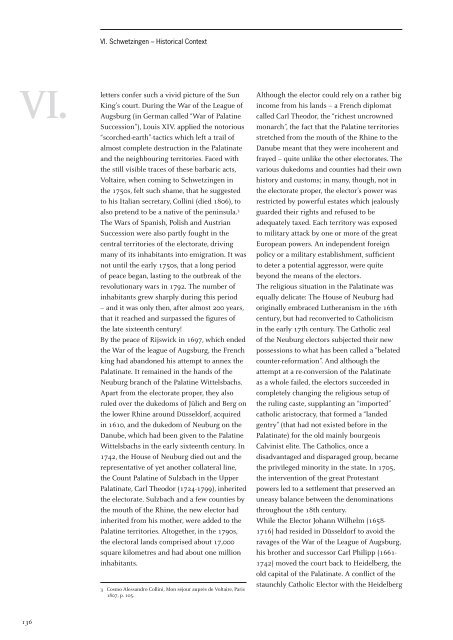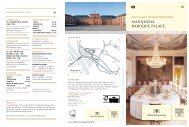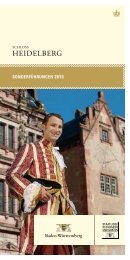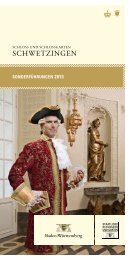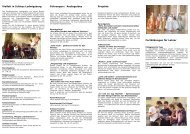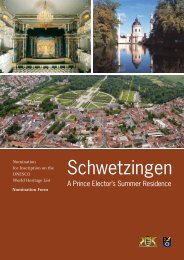Schwetzingen - Schlösser-Magazin
Schwetzingen - Schlösser-Magazin
Schwetzingen - Schlösser-Magazin
You also want an ePaper? Increase the reach of your titles
YUMPU automatically turns print PDFs into web optimized ePapers that Google loves.
VI.<br />
136<br />
VI. <strong>Schwetzingen</strong> – Historical Context<br />
letters confer such a vivid picture of the Sun<br />
King’s court. During the War of the League of<br />
Augsburg (in German called “War of Palatine<br />
Succession”), Louis XIV. applied the notorious<br />
“scorched-earth”-tactics which left a trail of<br />
almost complete destruction in the Palatinate<br />
and the neighbouring territories. Faced with<br />
the still visible traces of these barbaric acts,<br />
Voltaire, when coming to <strong>Schwetzingen</strong> in<br />
the 1750s, felt such shame, that he suggested<br />
to his Italian secretary, Collini (died 1806), to<br />
also pretend to be a native of the peninsula. 3<br />
The Wars of Spanish, Polish and Austrian<br />
Succession were also partly fought in the<br />
central territories of the electorate, driving<br />
many of its inhabitants into emigration. It was<br />
not until the early 1750s, that a long period<br />
of peace began, lasting to the outbreak of the<br />
revolutionary wars in 1792. The number of<br />
inhabitants grew sharply during this period<br />
– and it was only then, after almost 200 years,<br />
that it reached and surpassed the figures of<br />
the late sixteenth century!<br />
By the peace of Rijswick in 1697, which ended<br />
the War of the league of Augsburg, the French<br />
king had abandoned his attempt to annex the<br />
Palatinate. It remained in the hands of the<br />
Neuburg branch of the Palatine Wittelsbachs.<br />
Apart from the electorate proper, they also<br />
ruled over the dukedoms of Jülich and Berg on<br />
the lower Rhine around Düsseldorf, acquired<br />
in 1610, and the dukedom of Neuburg on the<br />
Danube, which had been given to the Palatine<br />
Wittelsbachs in the early sixteenth century. In<br />
1742, the House of Neuburg died out and the<br />
representative of yet another collateral line,<br />
the Count Palatine of Sulzbach in the Upper<br />
Palatinate, Carl Theodor (1724-1799), inherited<br />
the electorate. Sulzbach and a few counties by<br />
the mouth of the Rhine, the new elector had<br />
inherited from his mother, were added to the<br />
Palatine territories. Altogether, in the 1790s,<br />
the electoral lands comprised about 17,000<br />
square kilometres and had about one million<br />
inhabitants.<br />
3 Cosmo Alessandro Collini, Mon séjour auprès de Voltaire, Paris<br />
1807, p. 105.<br />
Although the elector could rely on a rather big<br />
income from his lands – a French diplomat<br />
called Carl Theodor, the “richest uncrowned<br />
monarch”, the fact that the Palatine territories<br />
stretched from the mouth of the Rhine to the<br />
Danube meant that they were incoherent and<br />
frayed – quite unlike the other electorates. The<br />
various dukedoms and counties had their own<br />
history and customs; in many, though, not in<br />
the electorate proper, the elector’s power was<br />
restricted by powerful estates which jealously<br />
guarded their rights and refused to be<br />
adequately taxed. Each territory was exposed<br />
to military attack by one or more of the great<br />
European powers. An independent foreign<br />
policy or a military establishment, sufficient<br />
to deter a potential aggressor, were quite<br />
beyond the means of the electors.<br />
The religious situation in the Palatinate was<br />
equally delicate: The House of Neuburg had<br />
originally embraced Lutheranism in the 16th<br />
century, but had reconverted to Catholicism<br />
in the early 17th century. The Catholic zeal<br />
of the Neuburg electors subjected their new<br />
possessions to what has been called a “belated<br />
counter-reformation”. And although the<br />
attempt at a re-conversion of the Palatinate<br />
as a whole failed, the electors succeeded in<br />
completely changing the religious setup of<br />
the ruling caste, supplanting an “imported”<br />
catholic aristocracy, that formed a “landed<br />
gentry” (that had not existed before in the<br />
Palatinate) for the old mainly bourgeois<br />
Calvinist elite. The Catholics, once a<br />
disadvantaged and disparaged group, became<br />
the privileged minority in the state. In 1705,<br />
the intervention of the great Protestant<br />
powers led to a settlement that preserved an<br />
uneasy balance between the denominations<br />
throughout the 18th century.<br />
While the Elector Johann Wilhelm (1658-<br />
1716) had resided in Düsseldorf to avoid the<br />
ravages of the War of the League of Augsburg,<br />
his brother and successor Carl Philipp (1661-<br />
1742) moved the court back to Heidelberg, the<br />
old capital of the Palatinate. A conflict of the<br />
staunchly Catholic Elector with the Heidelberg


